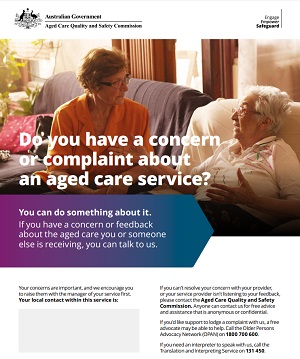This fact sheet helps aged care residents communicate their food and dining preferences. It includes sections for meal choices, dining preferences, assistance needs, health considerations, cultural or religious customs, and contact information for allied health professionals. It also advises staff to monitor changes in weight and contact a dietitian if needed.
This resource may refer to information that will be updated from 1 July 2025 to align with the new Aged Care Act and Quality Standards.

How to stay safe from COVID-19 video is available in 15 different languages. The video aims to help consumers understand the steps they can take to keep themselves safe during the current pandemic.

COVID-19 is an infection that can be more serious for some older people. We have developed a range of resources to help consumers understand their options on staying safe, keeping in touch with loved ones and keeping fit and active.
These translated guides provide useful information on how to stay safe in a time of COVID-19.

COVID-19 is an infection that’s more serious in some older people. You might be worried but there are ways you can connect with your loved ones while protecting yourself and others. The translated versions of this poster will show you how.

These translated guides will help you understand what to expect if someone has COVID-19 in your residential aged care service, including that a number of changes will take place. These changes will be made very quickly. You might be anxious when these changes take place but the aim is to keep you safe.

If someone has COVID-19 in your residential aged care service, a number of changes will take place. These changes will be made very quickly. You might be anxious when these changes take place but the aim is to keep you safe.
This poster has been translated into 15 languages to help residents understand what to expect in the time of COIVD-19.

Download the Charter of Aged Care Rights Template for Signing for aged care service providers and their consumers on 1 July 2019. Available in PDF and DOCX.
This resource is available in 18 translated languages including: Arabic, Chinese (simplified and traditional), Croatian, Dutch, German, Greek, Hindi, Hungarian, Italian, Korean, Macedonian, Maltese, Polish, Russian, Serbian, Spanish, and Vietnamese.


A poster outlining how to raise a concern about the quality of care a person is receiving.
This resource is available in 25 different languages including: Arabic, Armenian, Chinese Traditional, Chinese Simplified, Croatian, Dutch, English, French, German, Greek, Hindi, Hungarian, Italian, Korean, Latvian, Macedonian, Maltese, Polish, Portuguese, Russian, Serbian, Spanish, Tagalog, Turkish, Ukrainian and Vietnamese.









